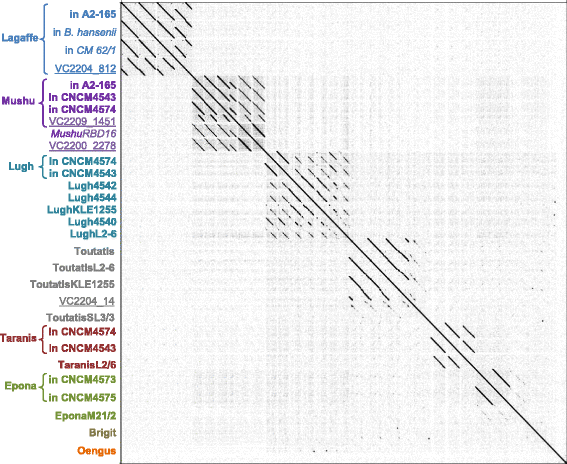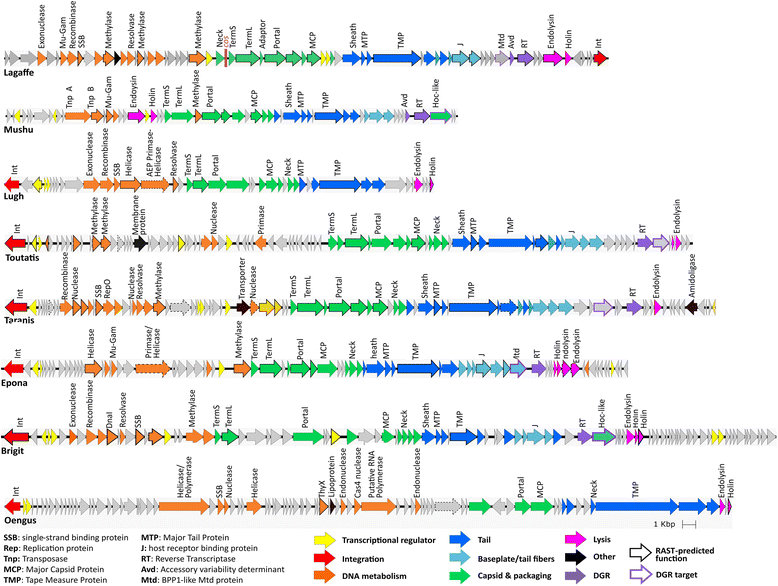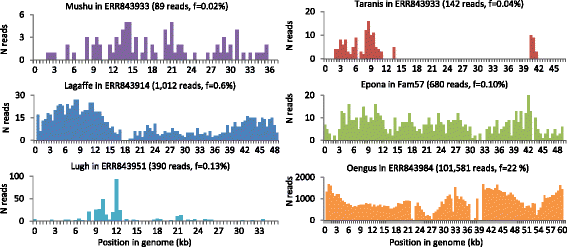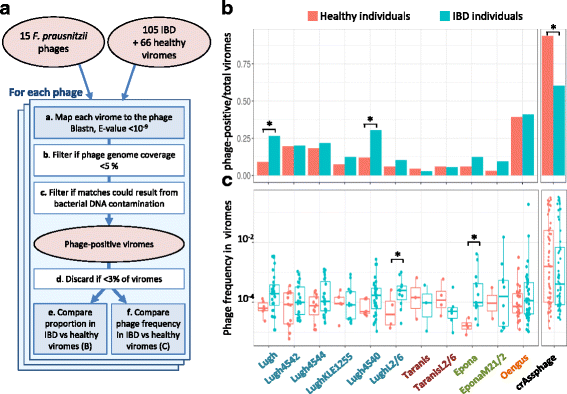Phages infecting Faecalibacterium prausnitzii belong to novel viral genera that help to decipher intestinal viromes
- PMID: 29615108
- PMCID: PMC5883640
- DOI: 10.1186/s40168-018-0452-1
Phages infecting Faecalibacterium prausnitzii belong to novel viral genera that help to decipher intestinal viromes
Abstract
Background: Viral metagenomic studies have suggested a role for bacteriophages in intestinal dysbiosis associated with several human diseases. However, interpretation of viral metagenomic studies is limited by the lack of knowledge of phages infecting major human gut commensal bacteria, such as Faecalibacterium prausnitzii, a bacterial symbiont repeatedly found depleted in inflammatory bowel disease (IBD) patients. In particular, no complete genomes of phages infecting F. prausnitzii are present in viral databases.
Methods: We identified 18 prophages in 15 genomes of F. prausnitzii, used comparative genomics to define eight phage clades, and annotated the genome of the type phage of each clade. For two of the phages, we studied prophage induction in vitro and in vivo in mice. Finally, we aligned reads from already published viral metagenomic data onto the newly identified phages.
Results: We show that each phage clade represents a novel viral genus and that a surprisingly large fraction of them (10 of the 18 phages) codes for a diversity-generating retroelement, which could contribute to their adaptation to the digestive tract environment. We obtained either experimental or in silico evidence of activity for at least one member of each genus. In addition, four of these phages are either significantly more prevalent or more abundant in stools of IBD patients than in those of healthy controls.
Conclusion: Since IBD patients generally have less F. prausnitzii in their microbiota than healthy controls, the higher prevalence or abundance of some of its phages may indicate that they are activated during disease. This in turn suggests that phages could trigger or aggravate F. prausnitzii depletion in patients. Our results show that prophage detection in sequenced strains of the microbiota can usefully complement viral metagenomic studies.
Keywords: Bacteriophages; Comparative genomics; Faecalibacterium prausnitzii; Inflammatory bowel disease; Prophages.
Conflict of interest statement
Ethics approval and consent to participate
All animal procedures were carried out according to the European Community Rules of Animal Care and with authorization 1234-2015101315238694 from French services.
Consent for publication
The manuscript does not contain any individual personal data in any form.
Competing interests
The authors declare that they have no competing interests.
Publisher’s Note
Springer Nature remains neutral with regard to jurisdictional claims in published maps and institutional affiliations.
Figures





Similar articles
-
Identification and characterization of Faecalibacterium prophages rich in diversity-generating retroelements.Microbiol Spectr. 2025 Feb 4;13(2):e0106624. doi: 10.1128/spectrum.01066-24. Epub 2024 Dec 31. Microbiol Spectr. 2025. PMID: 39745426 Free PMC article.
-
The Human Gut Phage Community and Its Implications for Health and Disease.Viruses. 2017 Jun 8;9(6):141. doi: 10.3390/v9060141. Viruses. 2017. PMID: 28594392 Free PMC article. Review.
-
Similar Depletion of Protective Faecalibacterium prausnitzii in Psoriasis and Inflammatory Bowel Disease, but not in Hidradenitis Suppurativa.J Crohns Colitis. 2016 Sep;10(9):1067-75. doi: 10.1093/ecco-jcc/jjw070. Epub 2016 Mar 12. J Crohns Colitis. 2016. PMID: 26971052
-
Faecalibacterium prausnitzii-derived microbial anti-inflammatory molecule regulates intestinal integrity in diabetes mellitus mice via modulating tight junction protein expression.J Diabetes. 2020 Mar;12(3):224-236. doi: 10.1111/1753-0407.12986. Epub 2019 Oct 30. J Diabetes. 2020. PMID: 31503404 Free PMC article.
-
Action and function of Faecalibacterium prausnitzii in health and disease.Best Pract Res Clin Gastroenterol. 2017 Dec;31(6):643-648. doi: 10.1016/j.bpg.2017.09.011. Epub 2017 Sep 18. Best Pract Res Clin Gastroenterol. 2017. PMID: 29566907 Review.
Cited by
-
Current Status of Phage Therapy against Infectious Diseases and Potential Application beyond Infectious Diseases.Int J Clin Pract. 2022 Oct 3;2022:4913146. doi: 10.1155/2022/4913146. eCollection 2022. Int J Clin Pract. 2022. PMID: 36263241 Free PMC article. Review.
-
The dark side of the gut: Virome-host interactions in intestinal homeostasis and disease.J Exp Med. 2021 May 3;218(5):e20201044. doi: 10.1084/jem.20201044. J Exp Med. 2021. PMID: 33760921 Free PMC article. Review.
-
Bacteriophages: Uncharacterized and Dynamic Regulators of the Immune System.Mediators Inflamm. 2019 Sep 8;2019:3730519. doi: 10.1155/2019/3730519. eCollection 2019. Mediators Inflamm. 2019. PMID: 31582898 Free PMC article. Review.
-
Diet and microbiome in the beginning of the sequence of gut inflammation.World J Clin Cases. 2021 Dec 26;9(36):11122-11147. doi: 10.12998/wjcc.v9.i36.11122. World J Clin Cases. 2021. PMID: 35071544 Free PMC article. Review.
-
Roles of Gut Bacteriophages in the Pathogenesis and Treatment of Inflammatory Bowel Disease.Front Cell Infect Microbiol. 2021 Nov 25;11:755650. doi: 10.3389/fcimb.2021.755650. eCollection 2021. Front Cell Infect Microbiol. 2021. PMID: 34900751 Free PMC article. Review.
References
-
- Quevrain E, Maubert MA, Michon C, Chain F, Marquant R, Tailhades J, Miquel S, Carlier L, Bermudez-Humaran LG, Pigneur B, et al. Identification of an anti-inflammatory protein from Faecalibacterium prausnitzii, a commensal bacterium deficient in Crohn's disease. Gut. 2016;65(3):415–425. doi: 10.1136/gutjnl-2014-307649. - DOI - PMC - PubMed
-
- Sokol H, Pigneur B, Watterlot L, Lakhdari O, Bermudez-Humaran LG, Gratadoux JJ, Blugeon S, Bridonneau C, Furet JP, Corthier G, et al. Faecalibacterium prausnitzii is an anti-inflammatory commensal bacterium identified by gut microbiota analysis of Crohn disease patients. Proc Natl Acad Sci U S A. 2008;105(43):16731–16736. doi: 10.1073/pnas.0804812105. - DOI - PMC - PubMed
Publication types
MeSH terms
Substances
LinkOut - more resources
Full Text Sources
Other Literature Sources
Molecular Biology Databases

